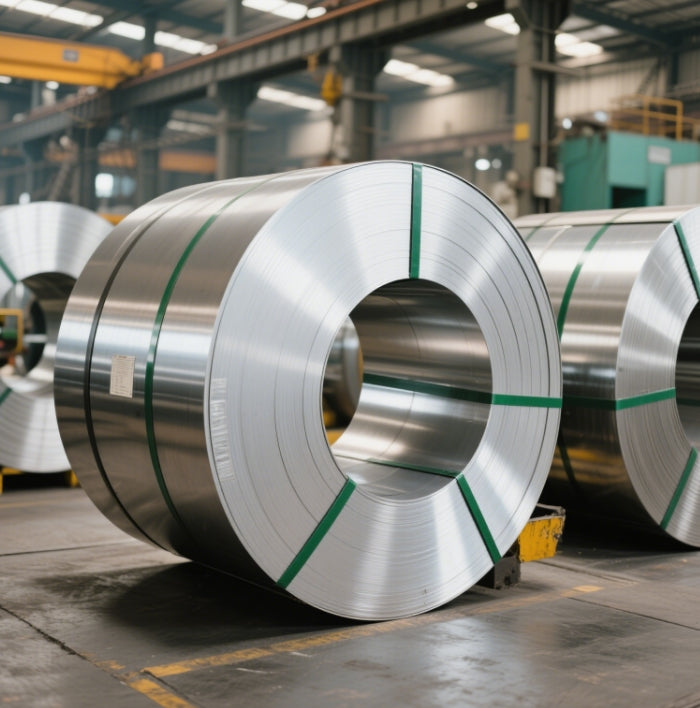StockSteel
Versatile 201/316L Stainless Steel Coil | Hairline Surface Excellence
Versatile 201/316L Stainless Steel Coil | Hairline Surface Excellence
Couldn't load pickup availability
Versatile 201/316L Stainless Steel Coil | Hairline Surface Excellence
Product Overview
| Property | 201 Stainless Steel Coil | 316L Stainless Steel Coil |
|---|---|---|
| Material Grade | ASTM A240, SUS201, EN 1.4372 | ASTM A240, SUS316L, EN 1.4404 |
| Thickness | 0.02–3.0 mm (Cold Rolled) | 0.1–20 mm (Cold/Hot Rolled) |
| Width | 600–1500 mm | 10–2438 mm (Customizable) |
| Surface Finish | Hairline, 2B, BA, No.4, 8K | Hairline, Mirror (8K), No.4, HL, Matte |
| Hardness | ≤183 HB | ≤187 HB (Annealed), ≤210 HV (Cold Worked) |
| Tensile Strength | ≥450 MPa | ≥480 MPa |
| Yield Strength | ≥205 MPa | ≥175–210 MPa |
| Elongation | ≥22% | ≥40% |
| Density | 7.70 g/cm³ | 7.98 g/cm³ |
| Melting Point | 1427°C | 1371–1450°C |
| Processing | Cold Rolled, Slitting, Embossing | Cold/Hot Rolled, Laser Cutting, Welding, Deep Drawing |
| Certifications | ASTM, JIS, GB/T | ISO 9001, SGS, RoHS, EN 10088 |
Key Technical Specifications
Tensile & Bend Strength
The 201 stainless steel coil offers a tensile strength of ≥450 MPa and yield strength of ≥205 MPa, making it ideal for decorative applications like automotive trim and architectural accents. Its ferritic structure ensures magnetic properties, which is advantageous for components requiring magnetism, such as coiled spring pins stainless steel.
The 316L stainless steel coil, enhanced with 2–3% molybdenum, delivers superior corrosion resistance in chloride-rich environments (e.g., marine or chemical plants). With a tensile strength of ≥480 MPa, it maintains structural integrity even at temperatures up to 870°C, making it suitable for coiled 316 stainless steel tubing in industrial pipelines.
Weight Calculation
Calculate coil weight using:
Example: A 316L coil (2mm thick, 1.5m wide, 50m long) weighs:
Identification Methods
- Chemical Analysis: Confirm Cr (16–18%) and Mn (5.5–7.5%) for 201; Cr (16–18%), Mo (2–3%), and Ni (10–14%) for 316L via XRF testing.
- Magnetic Testing: 201 is magnetic, while 316L remains non-magnetic unless cold-worked.
- Spark Testing: 201 generates bright, short sparks due to high manganese; 316L produces reddish sparks with minimal branching.
Causes of Stainless Steel Corrosion
- Chloride Exposure: Coastal environments or de-icing salts penetrate passive oxide layers, triggering pitting in 316L and intergranular corrosion in 201.
- Galvanic Corrosion: Contact with carbon steel or copper in humid conditions accelerates oxidation.
- Mechanical Damage: Scratches from coil stainless steel tubing handling expose raw metal to oxygen.
- High-Temperature Oxidation: Prolonged exposure above 843°C degrades chromium’s protective oxide film.
- Organic Acid Accumulation: Food residues or industrial chemicals form corrosive films on unpolished surfaces.
Applications & Advantages
Versatile Industrial Use
- Architecture: Hairline finishes enhance façades while resisting urban pollution.
- Automotive: Coiled spring pins stainless steel components leverage 201’s magnetism and formability.
- Chemical Processing: Coiled 316 stainless steel tubing resists sulfuric acid and chloride corrosion in pipelines.
Functional Benefits
- Self-Healing Oxide Layer: Chromium (≥16%) in 316L forms Cr₂O₃ film to repair minor scratches.
- Thermal Stability: Low thermal expansion (9.2×10⁻⁶/°C) minimizes warping under heat stress.
- Recyclability: 100% recyclable with no quality loss, supporting circular manufacturing goals.
Why Choose Our Stainless Steel Coils?
- Certified Quality: Sourced from TISCO/BAOSTEEL mills with ISO 9001 and SGS compliance.
- Custom Fabrication: Tailored slitting (3–2438mm), embossing, and polishing for coil stainless steel tubing projects.
- Global Logistics: 7–15-day delivery via FOB/CIF with VCI anti-rust packaging.
- Cost Efficiency: Direct mill partnerships reduce costs by 15–20% vs. competitors.
- Technical Expertise: 20+ years in alloy selection, welding, and corrosion prevention.

